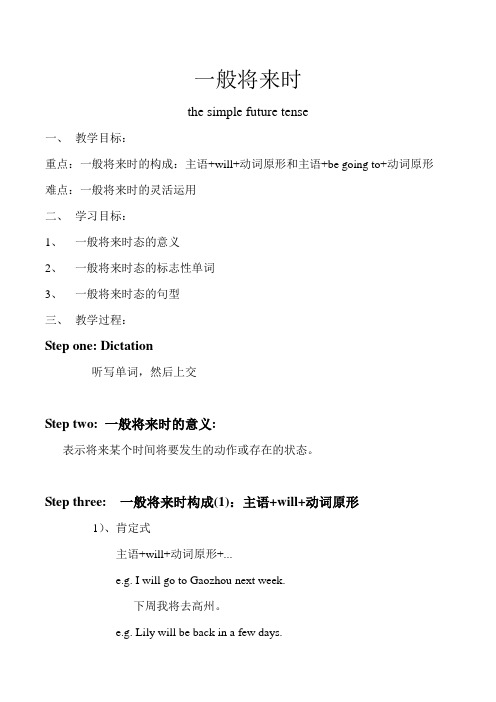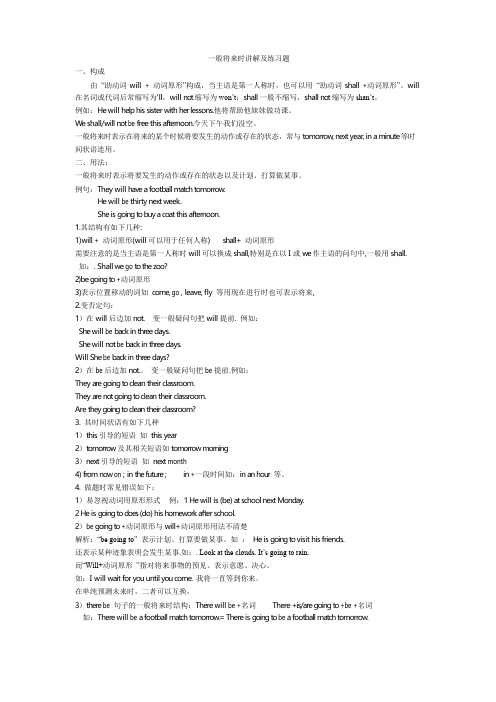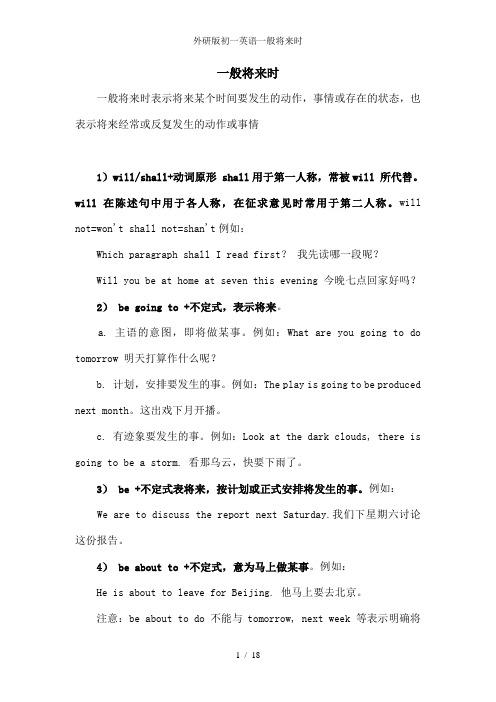外研版七年级下册《一般将来时》
初中英语外研版七年级下册M3U3知识点讲解

七年级英语下册M3U3知识讲解【语法】语法:一般将来时(一)(1)一般将来时:表示自己打算做某事,计划做某事或有意做某事;或表示即将发生某事。
(2)结构:主语 + be going to + 动词原形 + 其它Eg: 肯定句:I am going to visit Beijing tomorrow.我明天要去参观北京。
否定句:I am not going to visit Beijing tomorrow.我明天不会去参观北京。
一般疑问句:Are you going to visit Beijing tomorrow?你明天回去参观北京吗?肯定回答:Yes, I am.否定回答:No, I’m not.特殊疑问句:What are you going to do tomorrow?你明天打算干什么?(3)时间标志词:in + 时间段; tomorrow, the day after tomorrow(后天);next ~; ina week等(4)there be的将来时结构为:There is/ are going to be + 名词 + 地点短语Eg: There is going to be a meeting next week.下周将会有一个会议。
【知识讲解】1.Listen to music 听音乐Eg: She likes listening to music.她喜欢听音乐。
2.Go shopping= do some shopping 去购物Eg: She often goes shopping with her mother on weekends.她经常周末和妈妈去购物。
3.Do some sports 做运动Eg: Many young people in the UK do some sports on Saturday morning.在英国许多年轻人在周六上午做运动。
外研版英语初一年级英语英语一般将来时知识点及答案推荐精选

外研版英语初一年级英语英语一般将来时知识点及答案推荐精选一、初中英语一般将来时1.I _________ the shops. Can I get you anything?A. go toB. went toC. have gone toD. am going to【答案】 D【解析】【分析】句意:我将去商店,我可以给你买一些东西吗迭项八是一般现在时,表示经常性的行为或状态;选项B是一般过去时,表示动作发生在过去,和现在没有关系;选项C 是现在完成时,表示过去发生的动作对现在造成的影响或结果。
根据Can I get you anything?可知,说话的时候,还没有去商店,所以应该用一般将来时。
故选:D。
2.— Let's go fishing if it this weekend.— But nobody knows if it .A. is fine; will rainB. will be rain; rainsC. will be fine; will rainD. is fine; rains【答案】 A【解析】【分析】句意:——如果这个周末晴天我们去钓鱼吧。
——但是没人知道是否会下雨。
第一个空前的if引导条件状语从句,意思是“如果”,从句中用一般现在时表示将来;第二个空前的if引导宾语从句,意思是“是否”,根据从句的tomorrow可知用一般将来时;故选A。
【点评】考查动词的时态。
3.There ___________ a meeting tomorrow afternoon.A. will be going toB. will going to beC. is going to beD. will go to be【答案】 C【解析】【分析】句意:明天下午将有一次会议。
根据时间状语tomorrow afternoon 可知这里应该是there be结构的将来时:there will be或there is going to be,根据句意,故答案为C。
外研版英语七年级下册:Module 4 Unit 3 Language in use. 一般将来时

一般将来时the simple future tense一、教学目标:重点:一般将来时的构成:主语+will+动词原形和主语+be going to+动词原形难点:一般将来时的灵活运用二、学习目标:1、一般将来时态的意义2、一般将来时态的标志性单词3、一般将来时态的句型三、教学过程:Step one: Dictation听写单词,然后上交Step two: 一般将来时的意义:表示将来某个时间将要发生的动作或存在的状态。
Step three: 一般将来时构成(1):主语+will+动词原形1)、肯定式主语+will+动词原形+...e.g. I will go to Gaozhou next week.下周我将去高州。
e.g. Lily will be back in a few days.丽丽几天后将回来。
2)、否定式主语+will+not+动词原形+...e.g. I will not go to Gaozhou next week.下周我将不会去高州。
e.g. Lily won’t be back in a few days.丽丽几天后还不会回来。
3)、一般疑问式Will+主语+动词原形+...?A: Will you go to Beijing next week?B: Yes, I will.B: No, I won’t.A: Will Lily be back in a few days?B: Yes, she will.B: No, she won’t.Step four: 常与一般将来时连用的时间状语下次next time明天tomorrow明年next year今天下午this afternoon后天the day after tomorrow不久后a moment later将来in the future明天早上tomorrow morning一小时后In an hourStep five: 一般将来时构成(2):主语+be going to+动词原形1)、表示现在的意图,即打算在最近或不久的将来做某事。
外研版七年级下一般将来时讲解及练习题

外研版七年级下一般将来时讲解及练习题Module 2 短语与知识点总结:1、play后接乐器时,乐器名词前要加the,接球类、棋类名词时,不加theplay with sb 与某人玩play with a ball/ water/ the computer /a pen 玩球/ 玩水/ 玩电脑/ 玩笔2、ride a bike 骑自行车ride a hose 骑马drive a car/bus 开车fly a kite 放风筝3、take a bus/ car/taxi/train/plane 乘坐汽车/小汽车/出租车/火车/飞机take为动词,做谓语by bus/car/taxi/train/plane/bike乘汽车/小汽车/出租车/火车/飞机/ 自行车by为介词,介词短语放在句子末尾on the bus/train/plane 乘汽车/火车/自行车on为介词,介词短语放在句子末尾in the car/taxi 乘小汽车/出租车in为介词,介词短语放在句子末尾on foot 步行介词短语放在句子末尾4、the new clubs for this term 这学期的新俱乐部5、would like =want would like to do sth=want to do sth 想要做某事would like to be=want to be 想要成为、、、would like sth=want sth 想要某物Would you like some…、、? (some 不能变为any、) Would you li ke to do ……、?Yes, please、No, thanks、Yes, I’d love (like) to、I’d love to, but……6、join加入(团队、组织,人,俱乐部) join in 加入活动take part in 加入活动(侧重发挥作用)7、what about you?=how about you?=and you?您呢?what about doing sth?=how about doing sth?做某事怎么样?8、因为because所以so不能同时出现在一个句子中9、that’s all 仅此而已,就这么多That’s all for today、今天就讲到这里。
外研版英语初一年级英语英语一般将来时知识点含答案推荐精选

外研版英语初一年级英语英语一般将来时知识点含答案推荐精选一、初中英语一般将来时1.—You'd better take an umbrella. The weather report says it in the afternoon.— Thank you. I will put one in my bag.A. will rainB. rainsC. is raining【答案】 A【解析】【分析】句意:——你最好带把伞。
天气预报说是下午要下雨。
——谢谢你。
我会在包里放一个。
A一般将来时,B一般现在时,C现在进行时,根据 in the afternoon和 I will put one in my bag 可知时态是一般将来时,故选A。
【点评】考查时态,注意一般将来时的用法。
2.-- Tommy, do you know if they _____ to the zoo this Sunday if it _____?-- Sorry, I have no idea.A. will go; is fineB. go; is fineC. will go; is going to be fineD. go; will be fine【答案】 A【解析】【分析】句意:——Tommy,你知道这个星期天如果晴天他们是否去动物园吗?——对不起,我不知道。
第一个空前的if引导宾语从句,意思是“是否”,根据从句的tomorrow可知用一般将来时;第二个空前的if引导条件状语从句,意思是“如果”,从句中用一般现在时表示将来,故选A。
【点评】考查动词的时态。
3.I wonder when they ________ for Beijing. I will go to the train station to see them off when they ________.A. will leave; leaveB. leave; will leaveC. go; leaveD. will go; leave【答案】 A【解析】【分析】句意:我想知道他们什么时候去北京。
外研版七年级下册module3-4专项语法--一般将来时

一般将来时讲解及练习题一、构成由“助动词will+动词原形”构成,当主语是第一人称时,也可以用“助动词shall+动词原形”。
will 在名词或代词后常缩写为'll,will n o t缩写为won’t;shall一般不缩写,shall no t缩写为shan’t。
例如:He will help his sister with her lessons.他将帮助他妹妹做功课。
W e shall/will n ot be free this afternoon.今天下午我们没空。
一般将来时表示在将来的某个时候将要发生的动作或存在的状态,常与tomorrow,next year,in a minute等时间状语连用。
二、用法:一般将来时表示将要发生的动作或存在的状态以及计划、打算做某事。
例句:They will have a football mat ch tomorrow.He will be thirty next week.She is going t o buy a coat this afternoon.1.其结构有如下几种:1)will+动词原形(will可以用于任何人称)shall+动词原形需要注意的是当主语是第一人称时will可以换成shall,特别是在以I或we作主语的问句中,一般用shall.如:.Shall we go t o t he zoo?2)be going t o+动词原形3)表示位置移动的词如come,go,leave,fly等用现在进行时也可表示将来,2.变否定句:1)在will后边加not.变一般疑问句把will提前.例如:She will be back in thr ee days.She will n ot be back in thr ee days.Will She be back in thr ee days?2)在be后边加not.。
变一般疑问句把be提前.例如:They are going t o clean their classroom.They are no t going t o clean their classroom.Are they going t o clean their classroom?3.其时间状语有如下几种1)this引导的短语如this year2)tomorr ow及其相关短语如tomorr ow morning3)next引导的短语如next month4)from now on;in t h e future;in+一段时间如:in a n hour等。
外研版初一英语一般将来时

一般将来时一般将来时表示将来某个时间要发生的动作,事情或存在的状态,也表示将来经常或反复发生的动作或事情1)will/shall+动词原形 shall用于第一人称,常被will 所代替。
will 在陈述句中用于各人称,在征求意见时常用于第二人称。
will not=won't shall not=shan't例如:Which paragraph shall I read first?我先读哪一段呢?Will you be at home at seven this evening 今晚七点回家好吗?2) be going to +不定式,表示将来。
a. 主语的意图,即将做某事。
例如:What are you going to do tomorrow 明天打算作什么呢?b. 计划,安排要发生的事。
例如:The play is going to be produced next month。
这出戏下月开播。
c. 有迹象要发生的事。
例如:Look at the dark clouds, there is going to be a storm. 看那乌云,快要下雨了。
3) be +不定式表将来,按计划或正式安排将发生的事。
例如:We are to discuss the report next Saturday.我们下星期六讨论这份报告。
4) be about to +不定式,意为马上做某事。
例如:He is about to leave for Beijing. 他马上要去北京。
注意:be about to do 不能与tomorrow, next week 等表示明确将来时的时间状语连用。
Notice:be to和be going tobe to 表示客观安排或受人指示而做某事,be going to 表示主观的打算或计划。
例如:I am to play football tomorrow afternoon. 明天下午我去踢球。
外研版英语初一年级英语英语一般将来时知识点及答案解析

外研版英语初一年级英语英语一般将来时知识点及答案解析一、初中英语一般将来时1.—You'd better take an umbrella. The weather report says it in the afternoon.— Thank you. I will put one in my bag.A. will rainB. rainsC. is raining【答案】 A【解析】【分析】句意:——你最好带把伞。
天气预报说是下午要下雨。
——谢谢你。
我会在包里放一个。
A一般将来时,B一般现在时,C现在进行时,根据 in the afternoon和 I will put one in my bag 可知时态是一般将来时,故选A。
【点评】考查时态,注意一般将来时的用法。
2.-- Tommy, do you know if they _____ to the zoo this Sunday if it _____?-- Sorry, I have no idea.A. will go; is fineB. go; is fineC. will go; is going to be fineD. go; will be fine【答案】 A【解析】【分析】句意:——Tommy,你知道这个星期天如果晴天他们是否去动物园吗?——对不起,我不知道。
第一个空前的if引导宾语从句,意思是“是否”,根据从句的tomorrow可知用一般将来时;第二个空前的if引导条件状语从句,意思是“如果”,从句中用一般现在时表示将来,故选A。
【点评】考查动词的时态。
3.—Have you finished the poster for the party?—Not yet. I it in two days.A. finishB. finishedC. will finishD. have finished【答案】 C【解析】【分析】此题的关键点在“in two days”和一般将来时连用,故选C。
- 1、下载文档前请自行甄别文档内容的完整性,平台不提供额外的编辑、内容补充、找答案等附加服务。
- 2、"仅部分预览"的文档,不可在线预览部分如存在完整性等问题,可反馈申请退款(可完整预览的文档不适用该条件!)。
- 3、如文档侵犯您的权益,请联系客服反馈,我们会尽快为您处理(人工客服工作时间:9:00-18:30)。
一般将来时
Middle school of UPC
Wang Jingchuan
May, 23 2007
我们除了用“be going to+动词原形” 可以表示一般将来时外, 我们还可以用“will+ 动词原形”来表示一般 将来时.
will 引导的一般将来时:表示将来发生的动作或存在的状态, 最基本的结构:will + 动词原形
There will be only one country.
否定句:在will后面加not.
There won’t be only one country.
一般疑问句:把will提到there之前。
Will there be only one country? Yes, there will. / No, there won’t.
“主谓(宾)句型”的一般将来时:
肯定句:主语+ will +动词原形+(宾语)+其他
Some day people will go to the moon .
否定句:在will 的后面加not即可。will not 可缩写为 won’t
They won’t use books .
一般疑问句:把will 提到句子主语之前,结尾变问号。
There won`t be Will there be a a computer in it. compuer in it. They won`t do heavy work. Will they do heavy work?
一般将来时两种基本句式的区别:
在初中阶段来讲,”be going to+动词原 形”和“will+动词原形”这两种表示将来时 态的结构没什么区别。但在现代英语中,特别 是在口语中,表示将来时多用“be going to+ 动词原形”这一形式。另外他们主要区别在于 “be going to+动词原形”表示一个事先考虑 好的意图,相当于“打算、计划、准备”,而 will则表示未经事先考虑的意图。
A
4. We__ to the park if it is fine tomorrow.
D. to go
Functional Practise:
注意:在口语中,所有人称都可以用will.
一般将来时的主要用法:
1、表示将来某一时刻的动作或状态: We will come to see you the day after tomorrow. There will be a wonderful show next week.
2、表示将来某一段时间内经常的动作或状态: The students will come and work in the lab once a week. We will come and work in this factory every year.
Functional Practise:
1.Ihope that you__ a good time this evening. C A.have B.are having C.will have D.has 2.Look at those big black clouds. It __rain.Let`s hurry. D A.must B.will C.would D.is going to
注意:will与be going to的区别,be going to可以表示明显将要发生的情况.
3.There__ a basketball match this afternoon. B A.will have B.will be A.will go B.go C.has C.goes D.have
一般疑问
回答
Will I have Yes,I will. many presents? No,I won`t.
Will he do dull jobs? Yes, he will. No ,he won`t. Yes,there will. No,there won`t. Yes,they will. No,they won`t.
例句:
1.I will call you this evening. 2.Students will use computers to learn in the future. 3.He will help his sister with her lessons. 4.We won`t be free(空闲的) this afternoon. 5.She will not listen to me. 6.The birds won`t fly away to the south when the weather turns cold. 7.There will be a strong wind soon. 8.I will not tell it to him. 9.I think it will be very hot in Beijing next summer. 10.He will use his pen and his calculator. 11.Will there be heavy rain and strong winds?
Will students go to school in the future ?
特殊疑问句:特殊疑问词+will +主语+动词原形+其他?
What will your dream school have ?
“There be”句型的一般将来时
肯定句: There will be +名词+其他成份 [注意]:无论后面加单数名词或复数形式,be都必须用原形。
will句式总结:
肯定
I will have many presents.
He will do dull jobs. There will be a computer in it. They will do heavy work.
否定
I won`t have many presents.
He won`t do dull jobs.
